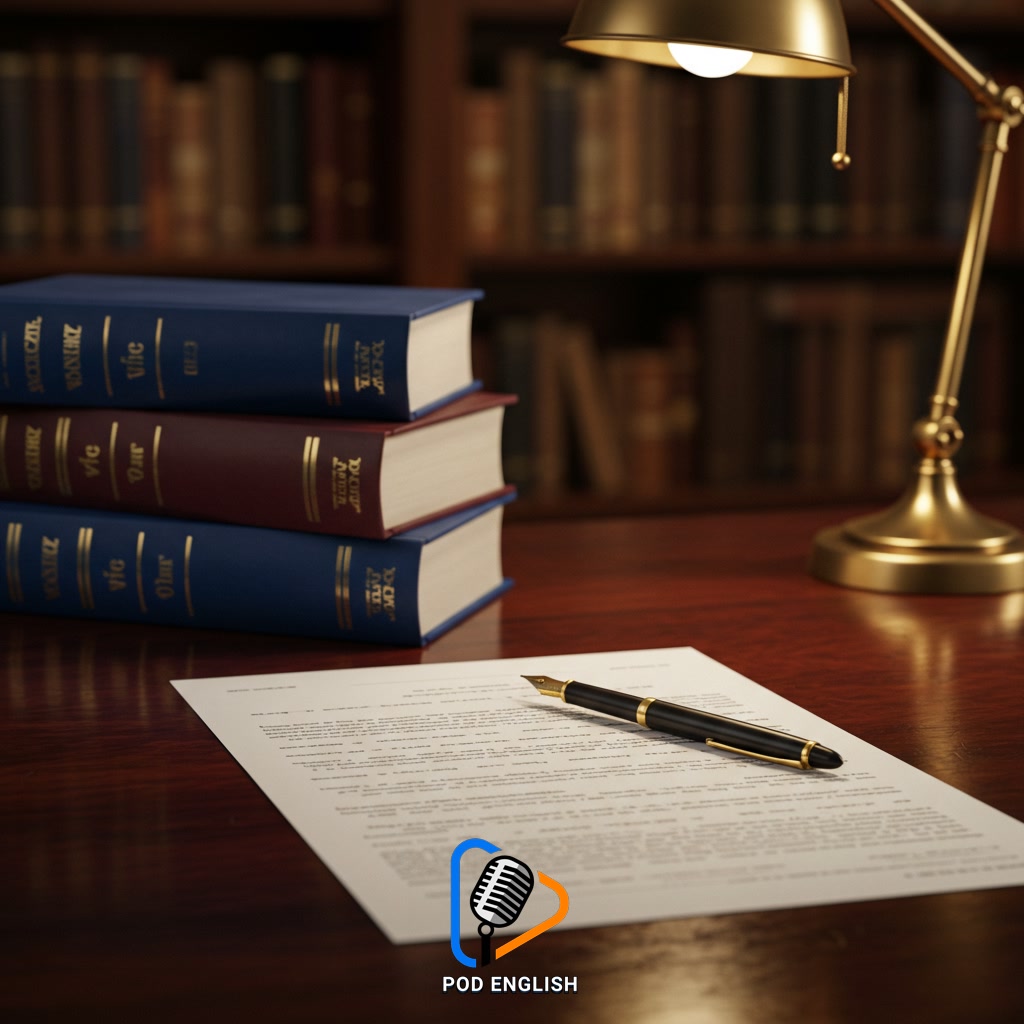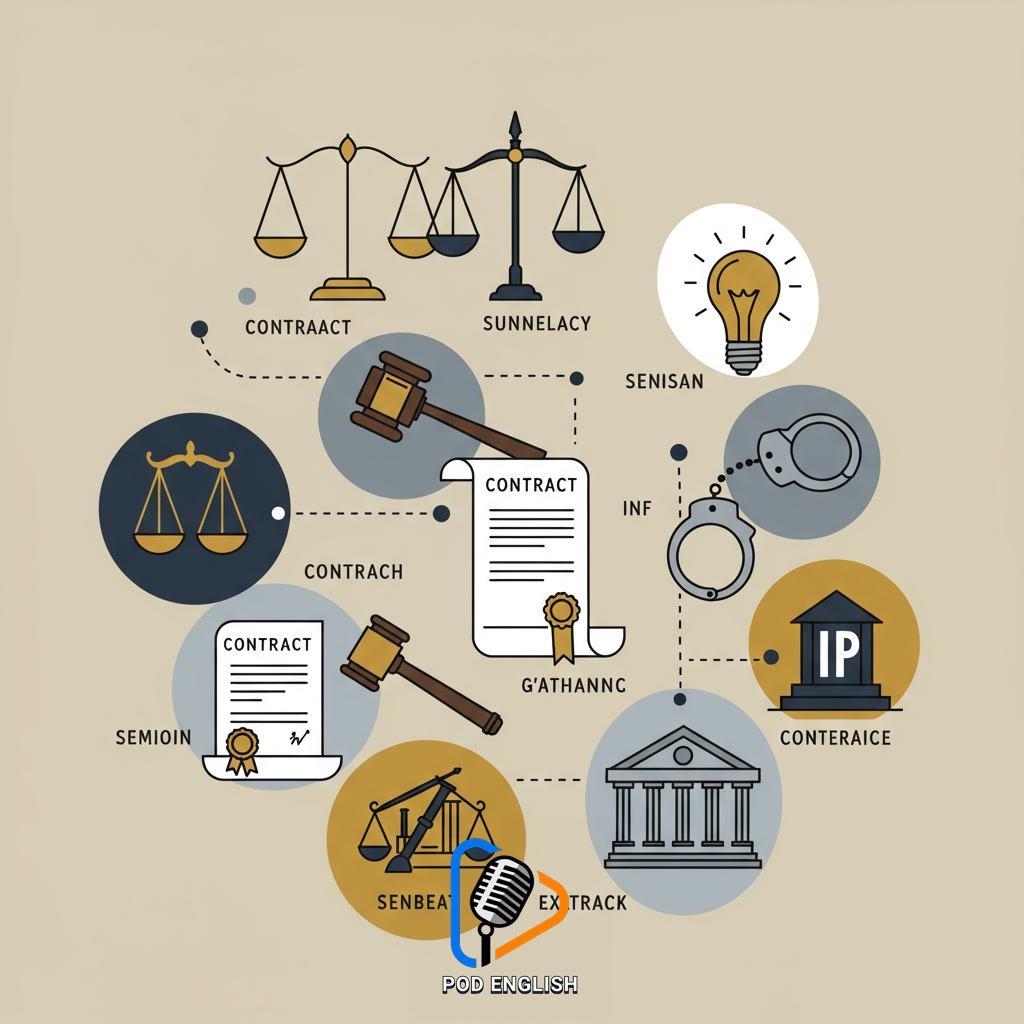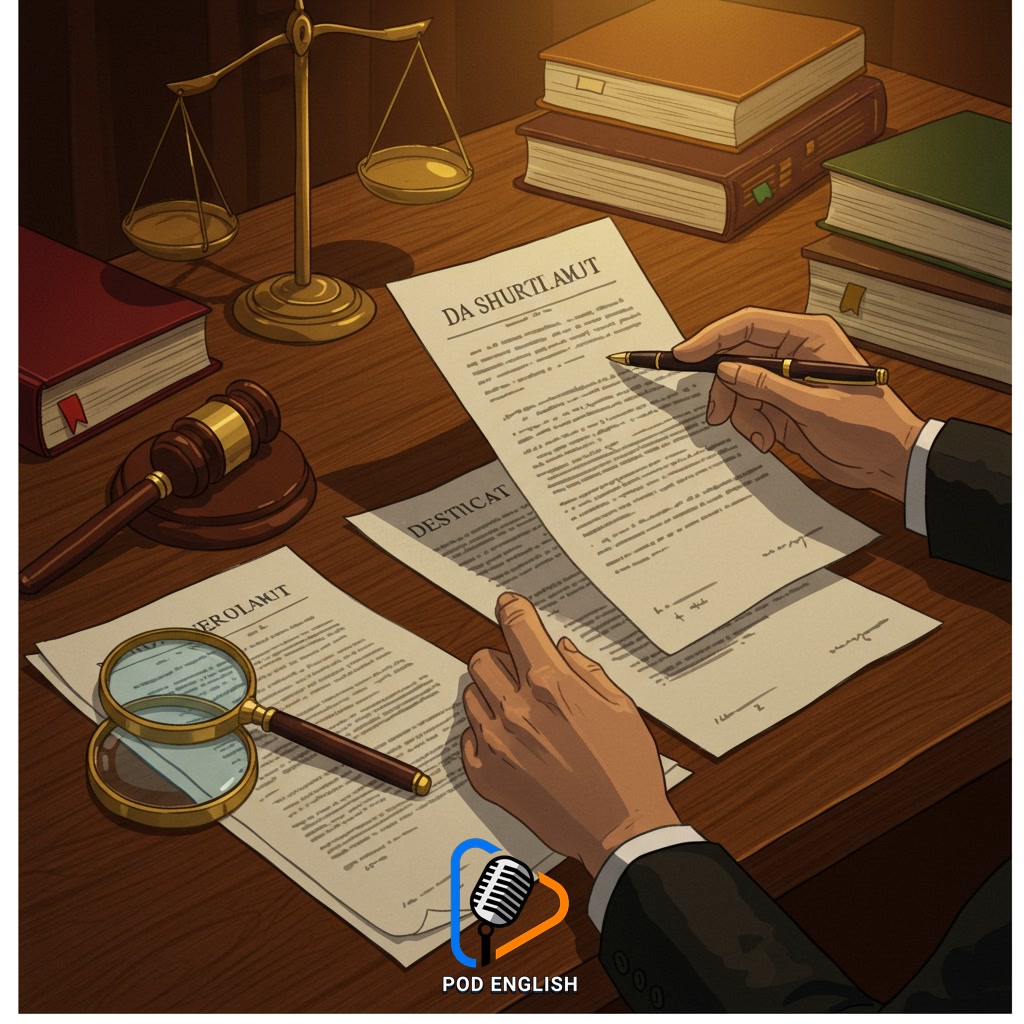Learn English
Essential English Vocabulary for Legal Professionals

This resource presents essential English vocabulary specifically curated for legal professionals. It serves as a practical guide for individuals dedicated to effectively learning and utilizing the specialized language of law. By focusing on key terms and phrases, it supports improved communication and understanding in global legal settings. This material is an indispensable aid for enhancing English language proficiency in the legal field.
Table of Contents
- Section 1: Introduction: The Importance of Legal English Vocabulary
- Section 2: Core Vocabulary for Different Legal Fields
- Section 3: Essential Terms for Legal Procedures and Courtroom Settings
- Section 4: Vocabulary for Drafting and Interpreting Legal Documents
- Section 5: Strategies for Effectively Learning Legal English Vocabulary
- Section 6: Recommended Resources for Expanding Your Legal English
- Section 7: Conclusion: Continuous Learning for Legal Professionals
Section 1: Introduction: The Importance of Legal English Vocabulary
Mastering specialized English vocabulary is not merely an advantage but a fundamental necessity for legal professionals in today’s interconnected world. The field of law relies heavily on precise language, where the exact meaning of a word can significantly impact a case’s outcome or the interpretation of a contract. Understanding and correctly using legal terminology ensures clear, unambiguous communication with clients, colleagues, and international counterparts. This specialized language is the bedrock of effective legal practice, enabling professionals to draft accurate documents, navigate complex legal concepts, and represent their clients competently across different jurisdictions. Investing time in learning this essential vocabulary is crucial for professional growth, credibility, and success in the global legal arena.

Section 2: Core Vocabulary for Different Legal Fields
While the foundation of legal English shares common principles of precision, the vocabulary required changes significantly depending on the specific field of law. A professional working in criminal law will encounter terms like ‘indictment,’ ‘arraignment,’ and ‘plea bargain’ regularly, which are distinct from the ‘articles of incorporation,’ ‘mergers and acquisitions,’ or ‘due diligence’ common in corporate law. Similarly, civil litigation involves terms such as ‘complaint,’ ‘discovery,’ and ‘deposition,’ differing from intellectual property law’s focus on ‘patents,’ ‘trademarks,’ and ‘copyrights.’ Mastering these core vocabularies tailored to specific practice areas is crucial for clear communication and effective work within that legal specialization, ensuring that legal concepts are understood and applied accurately.

Section 3: Essential Terms for Legal Procedures and Courtroom Settings
Building upon the foundational vocabulary for different legal fields, mastering terms specific to legal procedures and courtroom settings is equally crucial for any legal professional learning English. This section delves into the essential language used when discussing how legal cases progress, from initial filings and hearings to trials and appeals. Understanding terms like ‘plaintiff,’ ‘defendant,’ ‘prosecution,’ ‘defense,’ ‘judge,’ ‘jury,’ ‘witness,’ ‘evidence,’ ‘testimony,’ ‘verdict,’ and ‘judgment’ is vital. These words form the backbone of communication within the judicial system, enabling clear participation and comprehension in court proceedings, depositions, and other procedural interactions. Developing fluency in this area significantly enhances a legal professional’s ability to operate effectively in English-speaking legal environments.

Section 4: Vocabulary for Drafting and Interpreting Legal Documents
Building upon the foundational vocabulary for different legal fields and mastering terms specific to legal procedures and courtroom settings, legal professionals learning English must also acquire a precise vocabulary for handling legal documents. This section focuses on the essential terms and phrases used when drafting, reviewing, interpreting, and amending documents such as contracts, statutes, regulations, and pleadings. Understanding words like ‘whereas’, ‘notwithstanding’, ‘hereinafter’, ‘heretofore’, ‘provision’, ‘clause’, ‘stipulate’, ‘construe’, and ‘enact’ is crucial. Mastering these terms ensures clarity, accuracy, and effectiveness in creating legally binding texts and correctly understanding the intent and effect of existing legal writings, which is a fundamental aspect of legal practice in any language.

Section 5: Strategies for Effectively Learning Legal English Vocabulary
Building upon the foundational vocabulary for different legal fields and mastering terms specific to legal procedures and courtroom settings, legal professionals learning English must also acquire a range of effective strategies for vocabulary acquisition and retention. Simply encountering new words is not enough; active learning is crucial. Techniques such as using flashcards, creating mind maps to link related concepts and terms, and practicing new vocabulary in context through reading legal texts or drafting simple legal documents are highly beneficial. Regularly reviewing learned terms using spaced repetition techniques helps solidify memory. Furthermore, utilizing specialized legal dictionaries and online resources tailored for English language learners in law can provide valuable support and clarify nuances. Consistent, focused practice applying these strategies is key to building a robust legal English vocabulary over time.

Section 6: Recommended Resources for Expanding Your Legal English
Building upon the foundational vocabulary for different legal fields and mastering terms specific to legal procedures and courtroom settings, legal professionals learning English must also acquire a rich array of resources for continuous expansion. This section highlights valuable avenues for deepening your understanding and command of legal English beyond core lists. Explore specialized legal dictionaries and thesauruses designed for English learners, which provide context and usage examples. Engage with authentic materials such as legal articles, case summaries, and reputable legal news websites to see vocabulary in action. Consider dedicated Legal English textbooks and online courses that offer structured learning paths and practice exercises. Utilizing resources like legal podcasts or carefully selected legal dramas can also expose you to spoken legal English in various contexts. Actively seeking out and using these diverse resources is crucial for ongoing vocabulary growth and enhancing overall fluency in the legal domain.

Section 7: Conclusion: Continuous Learning for Legal Professionals
In conclusion, mastering essential English vocabulary is a fundamental step for legal professionals navigating a globalized world. While this resource has provided a strong foundation across various legal areas and procedural contexts, learning is a continuous journey. The legal field is constantly evolving, introducing new concepts, laws, and, consequently, new terminology. Therefore, dedicating time to regular study, practicing using new terms in context, and seeking out updated resources are crucial practices. Embracing continuous learning ensures that legal professionals remain proficient, confident, and effective communicators in English, capable of handling complex legal matters and collaborating internationally. Your commitment to this ongoing process is key to sustained success in your career.














